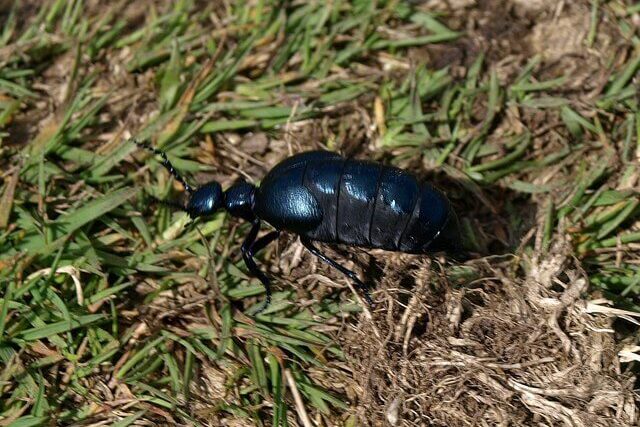
Sightings of the rare black oil beetle have surged at Kinver Edge, Staffordshire, a conservation site where habitat improvements were implemented.
Managed by the National Trust, this area near Stourbridge, Dudley, boasts rare lowland heathland, characterised by expansive landscapes dotted with trees and shrubs. The sandy soils provide an ideal habitat for invertebrates like the black oil beetle.
Ewan Chapman, National Trust countryside manager, noted a notable increase in beetle populations, particularly in restored heathland areas.
“This spring, they’ve spread throughout the landscape to make their home in areas of bare earth, which our team of rangers and volunteers create as part of their on-going management of this special habitat,” he said.
While this signals positive impacts from conservation efforts, Chapman emphasised the need for sustained action.
According to Andy Perry, National Trust conservation advisor, black oil beetles rely on ground-nesting solitary bees, which in turn depend on wildflowers for sustenance.
However, habitat loss, including the decline of heathlands and wildflower meadows, has led to the beetles’ rarity.
“The fact that the number of these rare beetles is rising, and they’re colonising more areas at Kinver, is testimony to the quality of habitat and health of wild bees at the site,” he added.
The black oil beetle is among the five remaining oil beetle species in the UK, alongside the violet oil beetle, short-necked oil beetle, rugged oil beetle, and Mediterranean oil beetle.
These beetles have been prioritised in the UK Biodiversity Action Plan due to significant declines resulting from changes in land management practices.
——————————————————————————
At Natural World Fund, we are passionate about stopping the decline in our wildlife.
The decline in our wildlife is shocking and frightening. Without much more support, many of the animals we know and love will continue in their decline towards extinction.
When you help to restore a patch of degraded land through rewilding to forests, meadows, or wetlands, you have a massive impact on the biodiversity at a local level. You give animals a home and food that they otherwise would not have had, and it has a positive snowball effect on the food chain.
We are convinced that this is much better for the UK than growing lots of fast-growing coniferous trees, solely to remove carbon, that don’t actually help our animals to thrive.
This is why we stand for restoring nature in the UK through responsible rewilding. For us, it is the right thing to do. Let’s do what’s right for nature!
Donate today at https://naturalworldfund.com/ and join in the solution!

